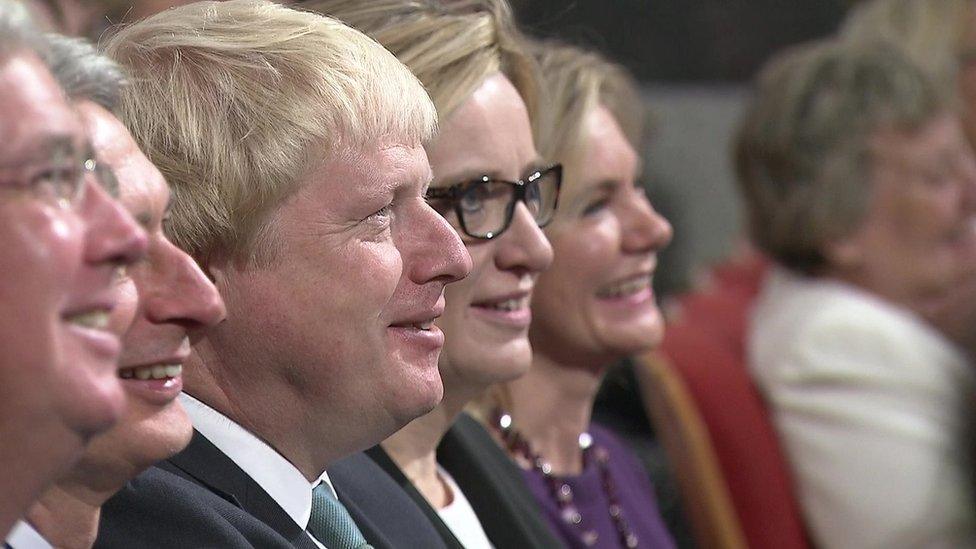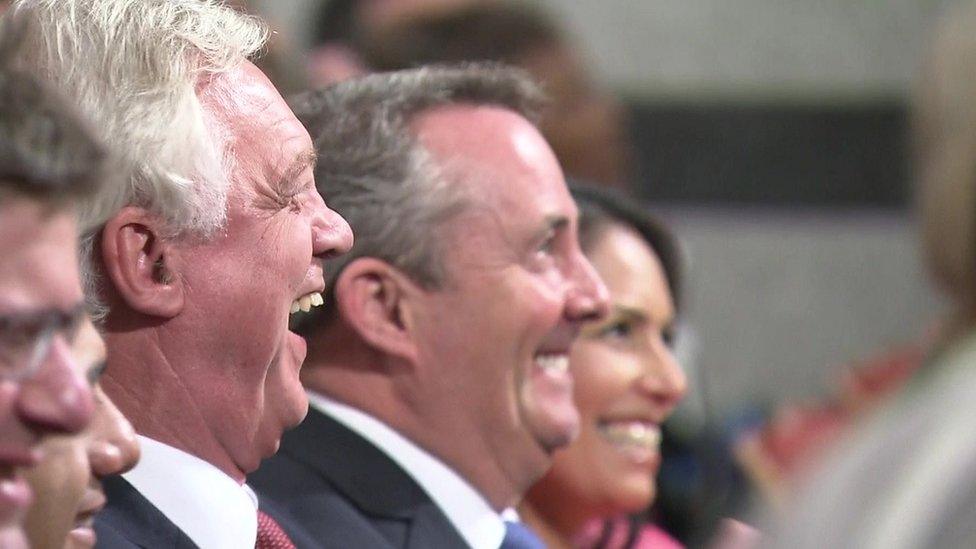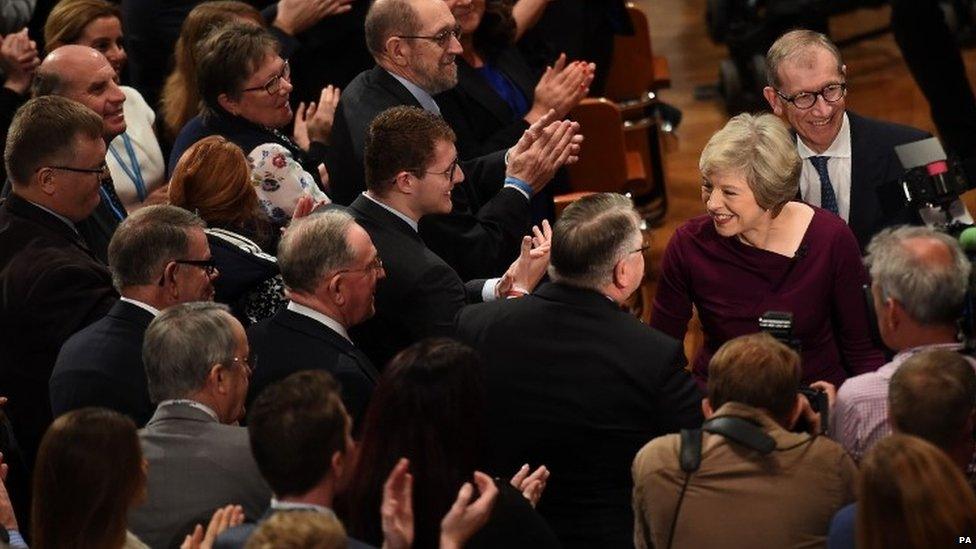Theresa May: I'll use power of state to build fairer Britain
- Published
Theresa May: 'Call for change in the way country works'
The Conservatives will use the power of government to "restore fairness" in Britain and spread prosperity more widely, Theresa May has said.
The prime minister told the party's conference the UK must change after the "quiet revolution" of the Brexit vote, urging people to "seize the day".
Labour were now seen as the "nasty party" and only the Tories would "stand up for the weak... up to the powerful".
The state should be a "force for good" to help working people, she argued.
In her set-piece speech in Birmingham, less than three months after she became prime minister, Mrs May said her vision was of a country "where everyone plays by the same rules and where every single person, regardless of their background or that of their parents, is given the chance to be all they want to be".
The vote to leave the EU, she said, was a "once-in-a-generation chance to change the country for good" and write a new page in its history.
Acknowledging the divisions caused by the referendum, she urged people whichever way they had voted "to come with me as we rise to meet this moment, come with me and together let's seize the day".
The rejection of the EU, she said, demonstrated not only a desire for greater control but also reflected the deep divisions that had built up in the country over generations, with working people too often ignored by the "privileged and powerful".
"It was not the wealthy who made the biggest sacrifices after the financial crisis, it was ordinary working class families," she said.

Mrs May joked that as well as questions about Brexit one of the biggest other ones this week had been whether 'Boris Johnson can stay on message for four days'

Mr Johnson's two fellow Brexiteers, David Davis and Liam Fox enjoyed that opening joke about the foreign secretary
"If you're one of those people who lost their job, who stayed in work but on reduced hours, took a pay cut as household bills rocketed, or - and I know a lot of people don't like to admit this - someone who finds themselves out of work or on lower wages because of low-skilled immigration, life simply doesn't seem fair.
"It feels like your dreams have been sacrificed in the service of others."
Promising to build a "united Britain rooted in a centre ground", she said her government would protect jobs and "repair" free markets when they did not work properly.
Setting out a "responsible capitalism" agenda, she said the government would "go after" businesses that regarded paying tax as "an optional extra", challenge those which recruited "cheap foreign labour" at the expense of British workers and, in a reference to the collapse of retailer BHS, condemn those who "take out massive dividends while knowing that the company pension is about to go bust".
Previous Tory leaders have sought to reduce state intervention, but Mrs May said her government would take action to identify injustice, find solutions and drive change.

Analysis by Carole Walker, BBC political correspondent

The prime minister says she would tip the balance in favour of working-class families
Theresa May sought to define herself as the leader of the post-referendum era. The woman who voted to remain in the EU who now understands that the vote to leave was a vote for more profound change.
There was a powerful warning that if the government fails to respond to the demand for change, resentment will grow and divisions will become entrenched.
In advance of the speech, many of the pro-Tory newspapers were headlining an attack on the liberal elite, who dismiss people's concerns about immigration and crime. But the big targets for Theresa May were the rich and powerful, the big businesses and vested interests who ignore the wider needs of society.
The Tory leader made a direct claim on Labour's territory, saying the Conservatives are now the party of the workers. Her opponents, she said, were not just divided but divisive. Her best line was a re-working of her famous sound bite, as she said it was Labour which was now being called "the nasty party".
But there were challenges for her own party too. She stressed the importance of the role of the state, the need for government to be a force for good. She promised a new industrial strategy and enhanced workers rights. It was a very different message from that of previous Tory leaders who have sought to reduce state intervention and roll back the size of government.
There were no concrete proposals for how she would right the wrongs in society. But we are told this was her vision, identifying what needs to change. The details of how this will happen will come from her ministers "in due course".
It was a commanding, confident performance from a leader who has swiftly assumed an air of powerful authority. But she will be judged on whether she does manage to deliver far-reaching change. And on whether she can get a Brexit deal which protects jobs and businesses whilst giving people the control over their lives that they were promised in the EU referendum.

In a speech containing no new policy announcements Mrs May talked at length about the values which would shape her premiership, saying Labour did not have "a monopoly on compassion" and criticising its "sanctimonious pretence of moral superiority".
"Let's make clear that they have given up the right to call themselves the party of the NHS, the party of the workers, the party of public servants."
In full: Theresa May's conference speech
And, to huge applause from the hall, she flipped the "nasty party" tag - which was how she famously said some saw the Conservatives back in 2002 - on to the Labour Party following their recent acrimonious leadership contest.
She restated her support for extending selective education in the state sector and expanding grammar schools, saying they had a role to play "where parents want them and where they will improve educational standards".
Making a pitch for the Tories to be the party of "ordinary working-class people", she said: "Just listen to the way a lot of politicians and commentators talk about the public.
"They find their patriotism distasteful, their concerns about immigration parochial, their views about crime illiberal, their attachment to their job security inconvenient.
"They find the fact that more than 17 million people voted to leave the European Union simply bewildering."
Recalling a summer sporting moment, the PM says we "succeed or fail together".
Dismissing the labels of the "socialist left and the libertarian right", she told Tory supporters: "It's time to remember the good that government can do.
"Where many see government as a problem, I want to show it can be part of the solution.
"While government does not have all the answers, government can and should be a force for good; that the state exists to provide what individual people, communities and markets cannot; and that we should employ the power of government for the good of the people."
The speech was praised by former justice secretary Michael Gove, sacked by Mrs May in July, who tweeted, external: "Government has a critical role to play in supporting commerce and enterprise, providing infrastructure and ensuring markets work for all. We need markets to generate wealth but support for them is undermined by inequality and excesses of undeserving rich."
But Labour said the speech marked a decisive shift to the right, with a "backwards" schools policy and no action to tackle an NHS in "financial meltdown".
The Lib Dems said their former coalition partners were now "divisive, reckless and uncaring" while the SNP attacked "repellent" proposals - announced on Tuesday - which could force businesses to spell out what proportion of their workforce is not British.
"Theresa May's vision of Brexit Britain is a deeply ugly one - a country where people are judged not by their ability or their contribution to the common good but by their birthplace or by their passport," said SNP leader Nicola Sturgeon.